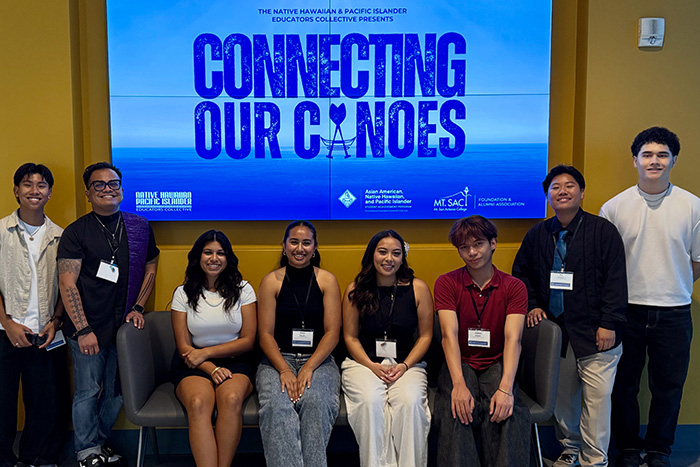SWC News Center
Connecting Our Canoes: Finding Belonging, Visibility, and Purpose in Higher Education
By: Ella Concepcion, Emily-Joy LeonGuerrero, Adrian Moster, Luke M. Schwenke, and Ale’a Tufaga - January 7, 2026

For many Native Hawaiian and Pacific Islander (NHPI) students, higher education can feel isolating. NHPI representation is limited, cultural understanding is often overlooked, and belonging can feel distant. Thanks to funding by the Southwestern College (SWC) Asian American, Native Hawaiian, and Pacific Islander (AANHPI) Student Empowerment & Academic Success (SEAS) program, that reality began to shift for SWC students who attended the “Connecting Our Canoes” conference at Mt. San Antonio College (Mt. SAC). Put together by the Native Hawaiian & Pacific Islanders Educators Collective (NHPIEC), this conference is designed for educators and advocates, committed to advancing equity and inclusion for NHPI communities. Our students' encounter was more than a conference, it was a shared awakening.
Luke M. Schwenke described the experience as one rooted in pride and connection. “What really stuck with me the most was the feeling of pride, a sense of belonging that I rarely get to feel so strongly,” he shared. For Schwenke, the “Connecting Our Canoes” theme perfectly captured how Pacific Islanders move through their own challenges while paddling toward the same horizon of representation, opportunity, and respect.
Often, Pacific Islanders are rendered invisible, grouped into broader categories that overlook their distinct identities and histories. Ella Concepcion, Emily-Joy LeonGuerrero, and Ale’a Tufaga reflected on how that invisibility shaped their early experiences at SWC, “There were not many people who looked like us—not in the offices, not in the classrooms, and definitely not in leadership roles,” they explained. That uncertainty shifted the moment they entered the conference space.
“We witnessed Pacific Islanders not only participating in higher education, but influencing it,” Concepcion, LeonGuerrero, and Tufaga shared. Seeing administrators, academics, and advocates proudly carry their culture while shaping policy and curriculum revealed the true power of visibility. “Representation is about validation,” they stated. “It teaches you that your voice should be heard in places that were never intended for you in the first place.”
For Adrian Moster, the conference marked a deeply personal turning point. “Being a Pacific Islander felt like something I had on paper for a long time, but did not really feel in real life,” he shared. Entering the NHPI conference, he expected to learn—but did not expect to feel such belonging. “People welcomed each other as if they were family. Conversations began with kindness, not credentials.”
Moster initially felt insecure about not knowing enough about his culture, but that feeling faded as he listened and observed. “Culture was not something to be tested—it was something to explore together,” he reflected. Hearing the phrase “Connecting Our Canoes” helped him realize that identity is not discovered alone, but through shared experience. “Being away from culture did not leave me out,” he wrote. “It just meant I was on a different journey. I arrived on time. I just got here.”
Across all experiences, one message was clear: visibility is power—but presence alone is not enough. Concepcion, LeonGuerrero, and Tufaga emphasized that low Pacific Islander representation at SWC should be viewed not just as a statistic, but as a call to action. They highlighted the need for more NHPI educators, counselors, administrators, and courses that center Pacific Islander histories and perspectives—not only in cultural programming, but in leadership and decision-making spaces.
Schwenke echoed that sentiment, reflecting on the educators, researchers, performers, pastors, and students he encountered at the conference. “Every educator, student, and advocate there was another paddle in the water,” he wrote. “Together, we are building something strong.”
Moster described the experience as healing, particularly for those who grew up feeling disconnected from their heritage. “I realized I did not need to prove who I am,” he shared. “I just had to accept it.” The sense of community support—people cheering one another on, celebrating growth, and welcoming curiosity—left a lasting impression. “Belonging is not a destination,” he reflected. “It is built with every step, every conversation, and every time you choose to be present.”
Our students left with a renewed sense of responsibility—not only to continue their own journeys, but to create space for others. Inspired by workshop lecturers such as Dr. Inoke Hafoka, Dr. Joyce Pualani Warren, and Dr. Samara Suafo’a, Concepcion, LeonGuerrero, and Tufaga emphasized that advocacy must continue so future Pacific Islander students never have to question their place in institutions that call themselves community.
Through “Connecting Our Canoes,” these students came to understand that being Pacific Islander is more than an identity—it is a legacy. Culture lives not only in tradition, but in how community is built, how care is shown, and how people support one another.
As Moster shared, “Now, I am paddling with intention.”
And as Schwenke reflected, when Pacific Islanders paddle together, they do not just move forward—they move mountains.